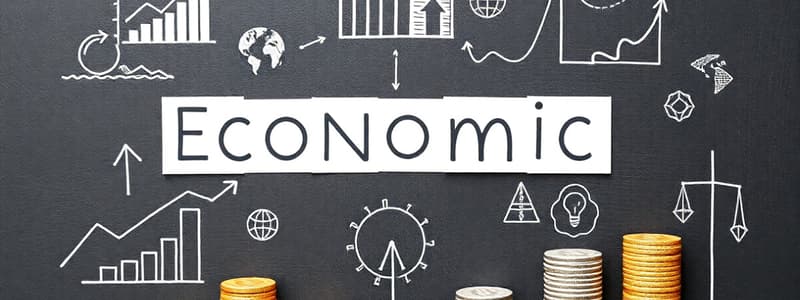Podcast
Questions and Answers
What is the primary challenge that scarcity presents in economics?
What is the primary challenge that scarcity presents in economics?
Scarcity forces choices about resource allocation to meet unlimited human wants.
Define equilibrium in the context of supply and demand.
Define equilibrium in the context of supply and demand.
Equilibrium is the point where supply equals demand in a market.
What differentiates microeconomics from macroeconomics?
What differentiates microeconomics from macroeconomics?
Microeconomics studies individual consumers and businesses, while macroeconomics examines the economy as a whole.
How does fiscal policy influence the economy?
How does fiscal policy influence the economy?
What is the significance of GDP as an economic indicator?
What is the significance of GDP as an economic indicator?
Flashcards are hidden until you start studying
Study Notes
Definition of Economic
- Relates to the production, distribution, and consumption of goods and services.
- Deals with the allocation of scarce resources to meet unlimited wants.
Key Concepts
-
Scarcity
- Limited resources versus unlimited human wants.
- Forces choices about resource allocation.
-
Supply and Demand
- Supply: Quantity of goods/services available.
- Demand: Consumer willingness to purchase.
- Equilibrium: Point where supply equals demand.
-
Types of Economics
- Microeconomics: Study of individual consumers and businesses.
- Macroeconomics: Study of the economy as a whole, including inflation, unemployment, and GDP.
-
Economic Systems
- Capitalism: Private ownership of resources; market-driven.
- Socialism: Collective or governmental ownership; state-managed.
- Mixed Economy: Combination of capitalism and socialism.
-
Market Structures
- Perfect Competition: Many sellers, identical products.
- Monopolistic Competition: Many sellers, differentiated products.
- Oligopoly: Few sellers dominate the market.
- Monopoly: Single seller controls the entire market.
-
Economic Indicators
- Gross Domestic Product (GDP): Total value of goods/services produced.
- Unemployment Rate: Percentage of labor force without jobs.
- Inflation Rate: Rate at which general price levels rise.
-
Fiscal and Monetary Policy
- Fiscal Policy: Government spending and taxation decisions.
- Monetary Policy: Central bank controls money supply and interest rates.
-
International Economics
- Focuses on trade between nations.
- Concepts include comparative advantage, trade balance, and exchange rates.
Economic Theories
- Classical Economics: Focuses on free markets and self-regulating nature.
- Keynesian Economics: Advocates for government intervention to boost demand.
- Supply-Side Economics: Emphasizes tax cuts and deregulation to stimulate growth.
Current Economic Issues
- Income inequality.
- Globalization and trade policies.
- Environmental economics and sustainability.
Conclusion
- Understanding economics is crucial for making informed decisions in business, policy-making, and personal finance.
- Economic principles govern everyday life and influence societal welfare.
Definition of Economic
- Concerns the production, distribution, and consumption of goods and services.
- Addresses the issue of allocating limited resources to satisfy endless human wants.
Key Concepts
-
Scarcity
- Involves the conflict between finite resources and infinite human desires.
- Necessitates decision-making about how to allocate resources effectively.
-
Supply and Demand
- Supply: Represents the quantity of goods and services that are available.
- Demand: Indicates how much consumers are willing to buy.
- Equilibrium: The state where the quantity supplied matches the quantity demanded.
-
Types of Economics
- Microeconomics: Examines individual consumer behavior and business operations.
- Macroeconomics: Analyzes aggregate economic factors like inflation, unemployment, and GDP.
-
Economic Systems
- Capitalism: Characterized by private ownership and market-driven principles.
- Socialism: Involves collective or government ownership with centralized control.
- Mixed Economy: Integrates elements of both capitalism and socialism.
-
Market Structures
- Perfect Competition: Features many sellers offering identical products.
- Monopolistic Competition: Comprises numerous sellers with differentiated products.
- Oligopoly: Market dominated by a few large sellers.
- Monopoly: A single seller has complete control over the market.
-
Economic Indicators
- Gross Domestic Product (GDP): Measures the total market value of all goods and services produced within a country.
- Unemployment Rate: The percentage of the workforce that is currently jobless and seeking employment.
- Inflation Rate: Represents the speed at which general price levels are increasing.
-
Fiscal and Monetary Policy
- Fiscal Policy: Involves government strategies regarding spending and taxation.
- Monetary Policy: Pertains to how a central bank manages the money supply and interest rates to influence economic activity.
-
International Economics
- Explores interactions and trade dynamics between different countries.
- Engages with concepts like comparative advantage, trade balance, and currency exchange rates.
Economic Theories
- Classical Economics: Emphasizes the efficiency of free markets and their self-regulating nature.
- Keynesian Economics: Supports government intervention to stimulate economic demand during downturns.
- Supply-Side Economics: Advocates for tax reductions and deregulation as means to encourage economic growth.
Current Economic Issues
- Income inequality is a growing concern affecting financial stability and social justice.
- Globalization impacts trade policies, leading to debates over local versus international markets.
- Environmental economics emphasizes the importance of sustainable practices in economic development.
Conclusion
- A robust understanding of economics is essential for making informed choices in business, governmental policies, and personal finances.
- Economic concepts underpin everyday decisions and play a significant role in shaping societal welfare.
Studying That Suits You
Use AI to generate personalized quizzes and flashcards to suit your learning preferences.




